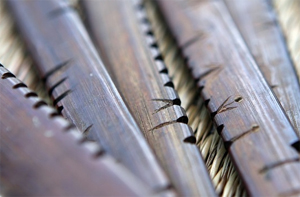
(HBO) – In July 2022, Hoa Binh province’s bamboo calendar of "khaw Doi” (khao Roi, Roi constellation) was recognised as part of the national intangible cultural heritage. This creates a great joy for not only the Muong ethnic group but also the Vietnamese people since the calendar is a long-standing demonstration of folk knowledge that has been upheld and applied to daily activities by Muong people throughout history.
Each Muong area in Hoa Binh has a different name for this bamboo calendar such as "khech Doi” (Doi book, Doi calendar) in Tan Lac, Cao Phong and Lac Son districts, or "fac ben” (notch carving) in some other places.
Culture researcher Bui Noi said for more than 1,000 years, the calendar has been shown on 12 bamboo bars that are about 25cm to over 30cm in length. The bars are inscribed with 30 notches representing 30 days in a lunar month. The notches are signs or symbols demonstrating the weather factors or astronomic phenomena believed to affect those days.
"Ngai khaw Roi” (khaw Đoi) in the Muong language means the Roi/Doi day, or the day of the Roi constellation. Locals in the Muong Bi area of Tan Lac district use the word "Doi” instead of "Roi”. The Roi constellation is the Tua Rua constellation.
Tua Rua is a folk name in the Vietnamese language for the M45 (Pleiades) star cluster in the Taurus constellation. In Vietnam, it is often seen in the early morning in the beginning of June, and can be seen above the eastern horizon in the ninth and 10th lunar months.
Millennia ago, pre-history humans of the Hoa Binh Civilisation (over 20,000 - 7,000 years ago) observed the sky, the movement of the sun, the moon, and stars, weather conditions, as well as wind and sunlight directions to serve their daily life activities.
In the following periods – Phung Nguyen and Dong Son civilisations, humans found the movement paths and rules of the sun, the moon, and stars in each season, on the basis of which they decided months and years. In particular, they realised that when the "khaw Roi (Doi)” constellation appears in the east, from which the sun rises, it’s the time for sow rice seeds.
Vietnam people have a tradition of cultivating wet rice, so worshipping the sun and observing the Roi/Doi/Tua Rua constellation to determine the right time for rice cultivation are of critically importance.
Given this, Muong people named their bamboo calendar after this star
With an increasingly vibrant and widespread emulation movement aimed at building cultured residential areas and cultured families, Yen Thuy District has been making steady progress toward improving both the material and spiritual well-being of its people, while fostering a civilized, prosperous, beautiful, and progressive community.
Once lacking recreational spaces and community facilities, Residential Group 2 in Quynh Lam Ward (Hoa Binh City) has recently received attention for the construction of a new, spacious, and fully equipped cultural house. The project followed the model of state support combined with public contributions in both labor and funding.
The "All people unite to build cultural life" movement, which has been effectively integrated with Kim Boi district’s socio-economic development goals, is fostering a lively spirit of emulation across local residential areas, hamlets, villages, public agencies, and enterprises. In addition, through the initiative, traditional cultural values are being preserved and promoted, while community solidarity and mutual support in poverty reduction and economic development are being strengthened.
A working delegation of the Hoa Binh provincial People’s Committee led by its Permanent Vice Chairman Nguyen Van Toan on June 11 inspected the progress of a project to build the Mo Muong Cultural Heritage Conservation Space linked to tourism services in Hop Phong commune, Cao Phong district.
Born and growing in the heroic land of Muong Dong, Dinh Thi Kieu Dung, a resident in Bo town of Kim Boi district, in her childhood was nurtured by the sweet lullabies of her grandmother and mother. These melodies deeply imprinted on her soul, becoming an inseparable part of her love for her ethnic group's culture. For over 20 years, this love for her hometown has driven Dung to research, collect, and pass down the cultural values of the Muong people to future generations.
In the final days of May, the Ethnic Art Troupe of Hoa Binh Province organized performances to serve the people in remote, mountainous, and particularly disadvantaged areas within the province. These were not just ordinary artistic shows, but they were the meaningful journeys aimed at spreading cultural values, enhancing the spiritual life of the people and contributing to the preservation of ethnic minority cultural identities.


